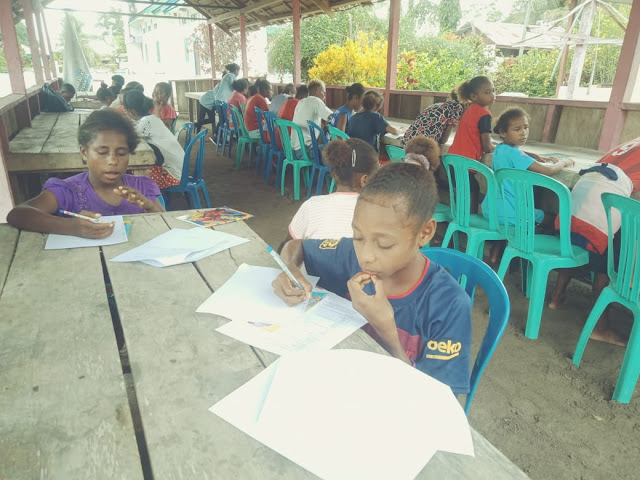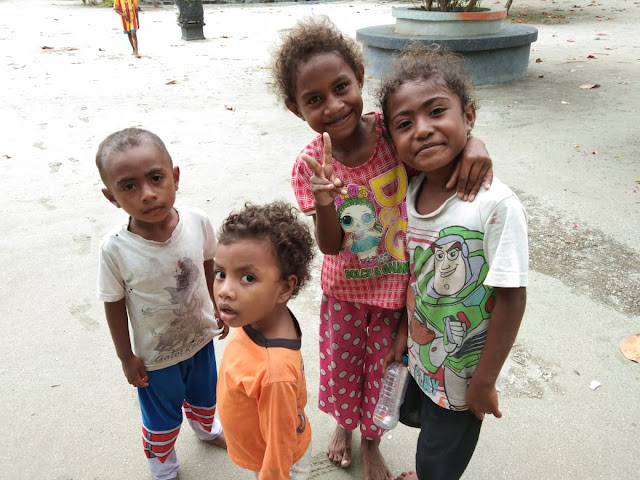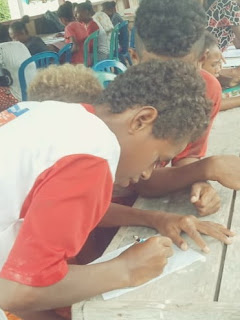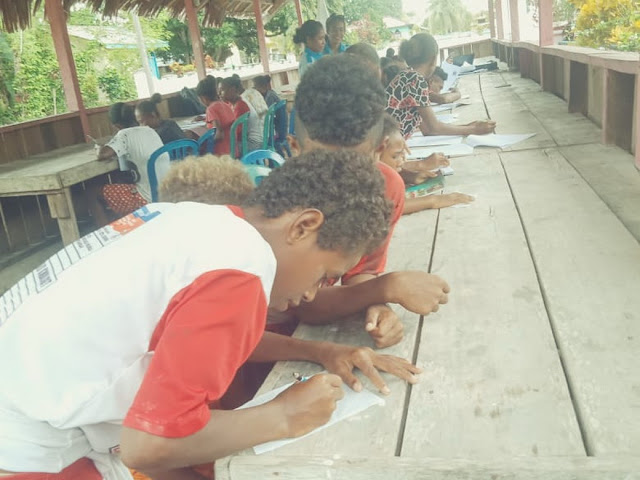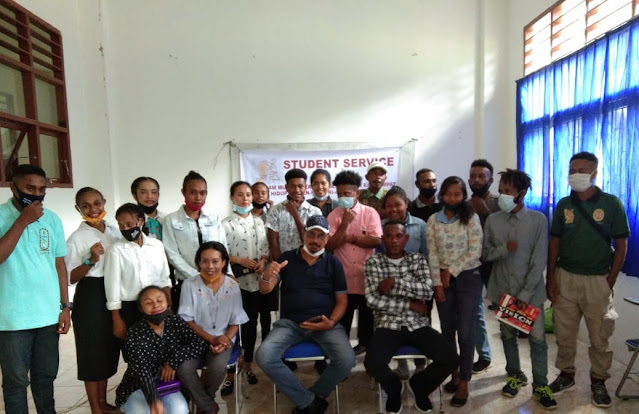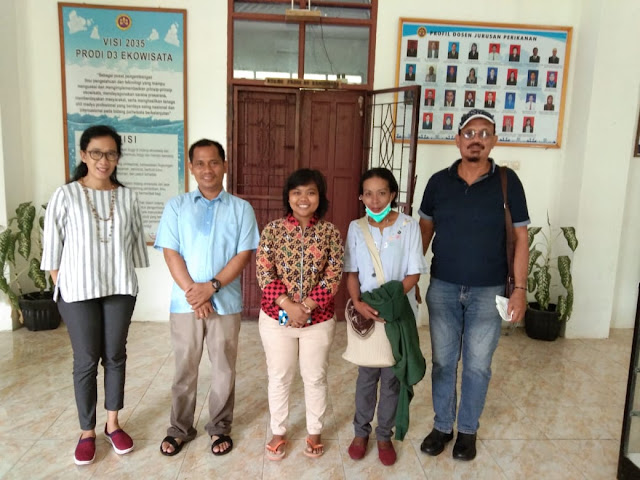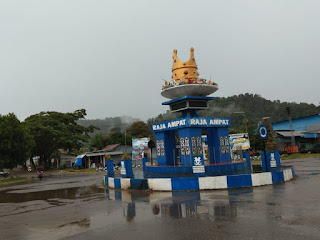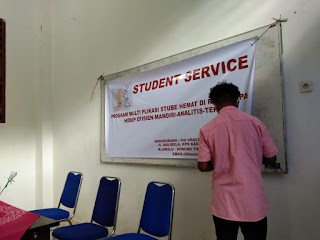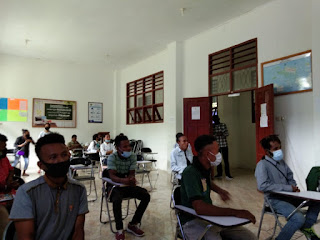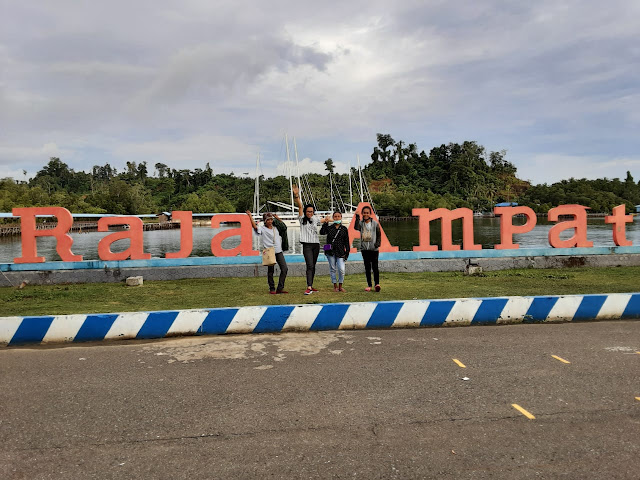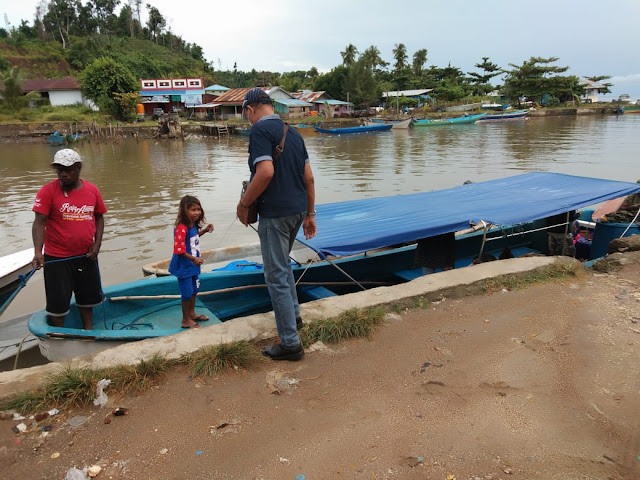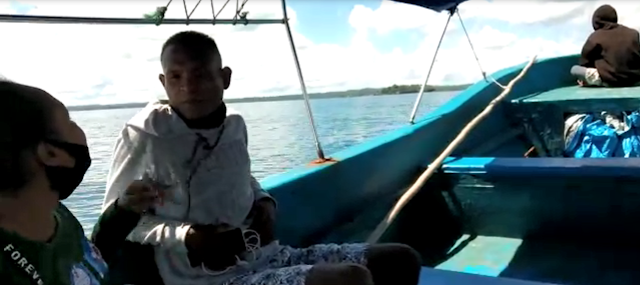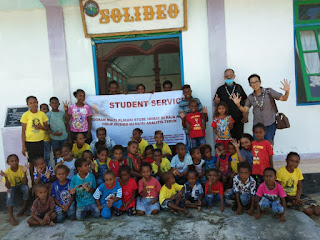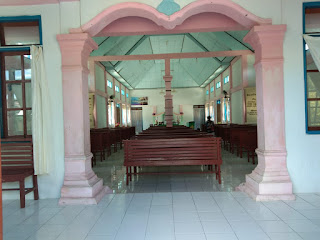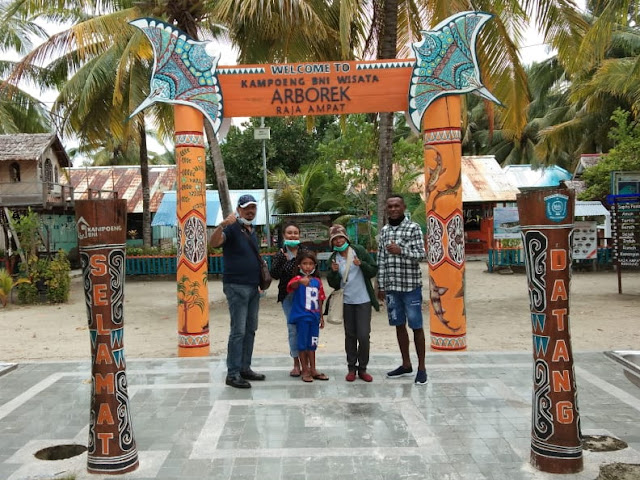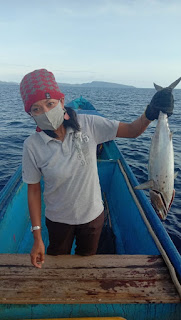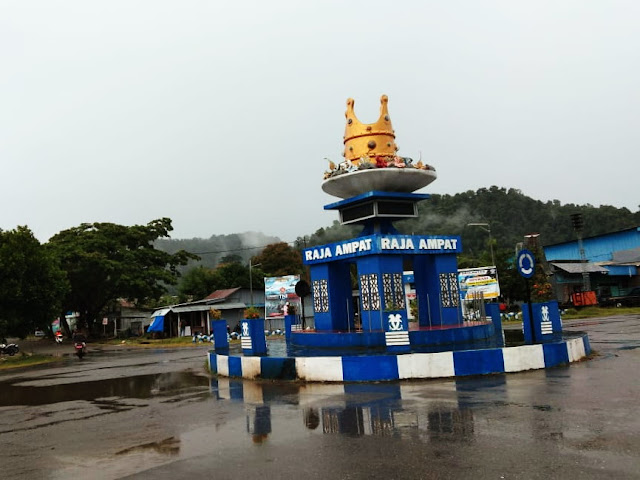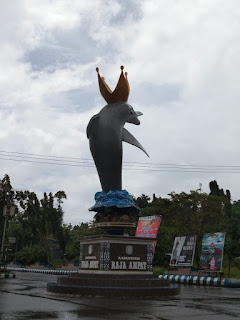The Youth Prayer Day of Kapatlap, Waipele, and Samate
Saturday, 19 December 2020by adminstube
Multiplication Program of Stube HEMAT in Raja Ampat
The activities of the Stube HEMAT Multiplication program in Raja Ampat encourage the development of young people and students by considering the local potencies and challenges that exist in the region including the existing local activity agenda. This is an effort to maintain connectedness between young people and students with their home regions and the local culture where they come from, grow and develop. It must be admitted that mentoring young people and students in the Raja Ampat region are quite difficult and challenging because geographically it is in an archipelago and the mobility by boat is very depended on weather and water condition.
One form of connection and involvement in local community activities is the Youth Prayer Day of Evangelical Christian Church (GKI) in Tanah Papua which is held every 18 December. Rev. Grace Nanuru, S.Th as the Multiplicator of Stube HEMAT in Raja Ampat and the students initiated a Youth Prayer Day in Kapatlap on December 18, 2020, and involved other youth from Waipele, and Samate regions with the theme “Youth Works and Serves”.
As a reflection in this event Rev. Grace Nanuru, who serves the Indonesian Christian Church (GKI) Soli Deo congregation, Kapatlap revealed the past and present situation of the people in Kapatlap. At that time they tended to choose to go to the sea for fishing, dumping nets, or working in the garden, especially during the durian fruit season, rather than attending worship meetings and other church activities. However, at this time the congregation was able to arrange the time to work and to worship. They even realized that they needed to add certain skills, for example, weaving and other skills. This is a good hope of life quality improvement for the local population. From the theme of “Youth Works and Serves”, Rev. Grace Nanuru invited local young people to develop themselves in all aspects according to the situation and potencies that exist around them, from the sea, from the garden, and from the beautiful and attractive places that exist.
Rev. Grace Nanuru also revealed that the youth and students of Raja Ampat should be grateful for God's blessings through the Multiplication program of Stube HEMAT in Raja Ampat which supports Raja Ampat youth and students to develop. But do not forget, God's blessing in the form of knowledge and skills is expected to be used to serve others in need.
The young people and students of Raja Ampat, especially the Kapatlap, Waipele, and Samate areas have shown enthusiasm to participate the Youth Prayer Day and building togetherness between them so that it becomes the starting point for the Multiplication program of Stube HEMAT to grow hopes for the development of a new-quality of young generation in Raja Ampat. (TRU).
Opening Hope through BaHiTus
Monday, 30 November 2020by adminstube
(Reading, counting and writing assistance for children in Waidim and Kapatlap, Raja Ampat regency)
Discussing Raja Ampat usually describes an archipelago. It is true, because Raja Ampat, one of the regencies in West Papua province has 600-large-and-small islands covering an area of 59 thousand km2 of the sea and only 7,5 thousand km2 of land, however, only a few islands are inhabited by residents and most of the islands have no name. Based on the 2020 Population Census, the population of West Papua is 1.134.068, consisting of 597.128 men and 536.940 women.
The existence of the population spreading across the islands is a big challenge for the government, churches, and other institutions to serve and to assist the community for government administration, education, health, religion, and other fields. Transportation and communication facilities have not reached every island well, moreover if the sea condition is not friendly, then the islands will become isolated. These kinds of obstacles also occur in the field of education where early education and elementary schools are only in certain villages so that children from small islands have to stay near the school if they want to go to school because they cannot cross by boat every day due to limited costs. Things got worse during the pandemic, schools were suspended and the teaching and learning could not be done online because the internet signal was very limited and the children did not have gadgets.
This is the anxiety of the Multipicator of Stube HEMAT in Raja Ampat and some of the student activists when they see that children do not go to school and some are unable to read, to count, and to write. They just play, run around and partly help their parents in the garden and in the sea for fishing. Not much could be done, finally, the Multiplication of Stube HEMAT in Raja Ampat team designed Reading, Counting, and Writing (BaHiTus) assistance for children in several villages on Batanta and Salawati islands so that the children could continue to learn during the pandemic.
In its implementation, the BaHiTus program was only be held in two locations, Waidim village in Samate and Kapatlap village in North Salawati district on November 26 and 27, 2020. Rev. Grace Nanuru and Mince Inseruy, a teaching student of Unimuda, Sorong City during the church service activities in Waidim. They assisted two study groups which were divided into two groups, a small class consisting of seven children and an intermediate group consisting of fifteen children. Small class children learned on recognizing letters, pronouncing and arranging syllables, while teen-aged children learned to combine words, to read and to write. It is not easy to learn new things, incorrect in distinguishing letters dan miswriting, or missing words when reading because they were not focused and unfamiliar, but they looked so excited and happy to follow.
A positive response was expressed by the head of Waidim village, Abner Parajal, "This is a very good activity because the children can learn, not just keep playing because of the pandemic, schools are closed. I hope this activity can continue for the children in Waidim."
This support and attention is an encouragement for the Multiplication program of Stube HEMAT Multiplication in Raja Ampat to continue the activity in other villages and provide benefits to the local community through activities that Raja Ampat students can do for their hometown. (TRU).
Generation of Hope
Tuesday, 24 November 2020by Pastor.(Em) Bambang Sumbodo
By Pastor.(Em) Bambang Sumbodo (Board-in-charge Stube HEMAT)
Morning greetings from the eastern part of Indonesia #4, Raja Ampat, West Papua
On Waigeo Island, which is the government center of Raja Ampat regency, we had an opportunity to meet students of Unipa (University of Papua) majoring in Eco-Tourism. Two lecturers greeted us warmly, they were Mr. Marjan from Toraja, South Sulawesi, and Mrs. Novelin from Medan, North Sumatra. They are really the unsung heroes, who fought to develop education in this place.
We were so happy because we could motivate them to learn and live. We emphasized that students as the next generation had to have idealism about the future and be a blessing for themselves, nation, and country. Nearly 80% of students come from areas outside Waigeo Island. These students looked pure and innocent, so it was our hope for them to be able to manage their lives efficiently, to have a motivation to be independent, to be able to analyze situations and opportunities, and to be perseverant in their efforts. They welcomed us with happy faces and had the hope of continuing to study in Java. We were very optimistic that in the future they will be able to manage the wealth of Raja Ampat, West Papua, which is so rich in nature for the country and Indonesians.
We ended the meeting by singing ‘Padamu Negeri’ song, and they memorized this song better than the song of Tanah Papua. May God bless these students for the nation and the country of Indonesia. ***
A Loving Community
Monday, 23 November 2020by Pastor (Em) Bambang Sumbodo
By Pastor (Em) Bambang Sumbodo (Board-in-charge Stube HEMAT)
Morning greetings from the Eastern part of Indonesia #3, Raja Ampat, West Papua
The key and characteristic of a peaceful society for me is mutual-cooperation. It is called mutual-cooperation when they live together, help each other, and pay attention to the needs of others ‘sangkul sinangkul ing bot repot’ (Javanese language: work together for social solidarity). During our visit to 4 islands of Raja Ampat, we were escorted by Kahar. He has been working in the ocean as a speed boat driver since he was young. He comes from Misool Island, southern Raja Ampat which is known for its strong waves, so, no wonder if he becomes a tough sailor. Strong body and healthy, he was able to deal with the wind and rain during the voyage by his speed boat.
Kahar is a Muslim, he married to a Christian woman from the island of Salawati having nearly 99% Christians inhabitants. Kahar continues to practice Islam though his wife passed away because of tongue cancer. He lives comfortably in practicing his faith and his Christians friends are also comfortable in worship. His children were given their freedom to make their choice of religion. From the name of his son, Yustus, it is clear that he has a Christian name, and Mustamin has the Muslim name, but they both attend the church sermon. Actually, religion is a choice of life, it should not be forced to choose because it is the basic human right to decide the choice of religion and to practice worship.
From Raja Ampat, we learned the basic human rights, where the law of love said by the Lord Jesus was applied. Matthew 22: 37-40, "Jesus said to him: "Love the Lord your God with all your heart and with all your soul and with all your mind. This is the first and greatest commandment. The second is like it: ‘Love your neighbor as yourself’. All the laws and the prophets depend on these two commandments.” Immanuel. ***
Created to Glorify The Lord
Sunday, 22 November 2020by Pastor. (Em) Bambang Sumbodo
By Pastor. (Em) Bambang Sumbodo (Board-in-charge Stube HEMAT)
Morning greetings from the eastern part of Indonesia #2, Raja Ampat, West Papua
The first day of our foot set on Raja Ampat was in Kapatlap Village, the northern Salawati Island. In this village Pastor Grace Nanuru serves the members of the Solideo Evangelical Christian Church. The Sunday school children at this church were very happy to see us. We prayed them all to be children of God and to be blessings for the welfare of their island, country, and church. They live in the midst of limitations of school facilities and economic conditions because their parents work as traditional fishermen. But they are very happy with the atmosphere of their family, community, church, nature of the beach and sea. We felt so glad when they sang about the coming of the Lord Jesus. For me, it contained a deep theological understanding because there is no social difference. From Kapatlap village, we sailed across the sea to Yenanas in Batanta Island.
We felt the hospitality of the people there. We witnessed the extraordinary warm welcome of the people also the culture of cooperation, no suspicion, we were always welcomed by having meals together. When we left they took us to the beach pier even though it was hot or rainy. The waving hands became the romantic bond of a close brotherly that we felt, even though we just met for the first time. This kind of attitude is difficult to find currently, maybe it almost disappeared in urban communities or other areas.
We remembered the Words of God in Romans 15: 9-13, '.... and to enable the nations, that they might glorify God for His mercy, ....'. So, if the aim is glorifying God, of course, there will be a sense of brotherhood, solidarity, one heart, and one soul. We experienced what the Papuan people did, what the Papuan felt, and that's what we saw from island to island. ***
Grace Nanuru, a small figure having a big courage
Saturday, 21 November 2020by Pastor. (Em) Bambang Sumbodo
By Pastor. (Em) Bambang Sumbodo (Board-in-charge of Stube HEMAT)
Morning greetings from the Eastern part of Indonesia #1, Raja Ampat, West Papua
The trip from Sorong to Salawati island, Batanta Island, Waigeo island, and Arborek Island of Raja Ampat was done by speed boat. Traveling by sea has its dynamics, sometimes there was a calm and fresh voyage, but in another time it was rainy and scary wave. We experienced such situation during our trip, so we could feel the challenges in the ministry of pastor Grace Nanuru and all pastors in Raja Ampat as well. Sometimes pastor Nanuru sails using her roofless speed boat in a small engine boat for 4 passengers during her services. When it rains, of course, the raindrops hit them and the sunlight heated during the day time. The trip between islands takes at least 90 minutes (one and a half hours).
Her living cost is not too much (around 2 million rupiahs) with 2 children who are in grade 2 of junior high school and grade 3 in elementary school. We witnessed the extraordinary tireless spirit of her service, even though she had a small figure but she had a big courage because she took risky service almost every day, even her little daughter accompanied her sailing across the sea. I shed tears when I was with pastor Grace on the boat. If I compared her ministry with what I did, I had nothing to compare about. Lord Jesus called and sent pastor Grace to preach in the inter-island based only on the love and inclusion of the Lord Jesus.
She and the congregation saw the tourists who enjoyed the holidays and spent tens of millions on cruise ships enjoying the area, however, the pastor and the congregation kept smiling because they could make tourists happy even though their own lives were full of struggles. "Rejoice in the Lord, once again I say rejoice in the Lord Jesus," Philippians 4:4. ***
Student Discussion: Blank Voting Box Phenomenon
Friday, 6 November 2020by adminstube
Multiplication of Stube HEMAT in Raja Ampat
The election of Raja Ampat regional head (Pilkada) in 2020 was unforgetable because there was an interesting phenomenon that there was only one candidate pair and the candidate competed with a blank voting box. This case is an interesting lesson related to politics and it raises questions, such as why there is only one candidate, are there no other potential candidates, whether the politics is no longer interesting, are people reluctant to get involved in politics, and other questions.
Regional election (Pilkada) is a part of democracy that allows the people to take part in determining the government which is manifested in electing leaders and representatives directly. In connection with the question, political education is important to increase public awareness to participate in democracy, in this case, a regional leader election.
Political education with context of Pilkada in Raja Ampat Regency is important because it will equip the people with the correct knowledge and understanding to have political attitude, in this case, how to vote. Multiplication of Stube HEMAT in Raja Ampat, which assists young people and students, facilitated student activists in Raja Ampat and Sorong to learn about regional elections and the phenomenon of a blank voting box. This is part of political education for young people and students so that later they do not just make a choise but also have strong reason why to make it.
The discussion was held on November 4, 2020, in the meeting room of the Wong Solo restaurant and was attended by dozens of activist students of the Stube HEMAT Multiplication program in Raja Ampat. Rev. Grace Nanuru, S.Th., who is also a Stube Multiplicator, guided the discussion of students from Unamin, Unimuda, and Stikes Sorong campuses. In this discussion, it was revealed that the existing political dynamics warmed up the preparation situation of Raja Ampat regional election. The incumbent who had supported by twelve parties made difficult for other prospective candidates to get support in the Pilkada. It created turmoil both at the elite and community levels because it hampered the process of democratization and the people had no other choice.
Even with the following dynamics, there was a movement that eventually formed a ‘success team’ to promote a ‘blank box’ in the Raja Ampat election. The emergence of two groups between pro candidates and pro blank box led to frictions between them and it was seen on the heating comment war on social media groups.
At the end of the discussion, as a joint conclusion, students do not need to act frontally but can provide the correct understanding that this condition is part of the political dynamics, not to cause disputes that harm the community. Students are expected to participate on December 9, 2020, to vote as a manifestation of democracy in Raja Ampat regency. (TRU)
Stube HEMAT Anchored in Raja Ampat
Thursday, 30 July 2020by Pst. Grace Nanuru, S.Th
The presence of Multiplication program of Stube HEMAT in Raja Ampat opens a new hope of service for community in Raja Ampat and this is a God’s blessing that has never imagined before. Formerly I took part in Stube HEMAT when I was a student in Yogyakarta and after returning to my hometown, I served a congregation in a rural area, at GKI Soli Deo in Kapatlap, North Salawati district, Raja Ampat regency. In fact, God’s hands is not short enough to save, and His hearing is enough to hear. Finally, God's blessing through Stube HEMAT reached my place, the ministry in Raja Ampat, Papua.
Raja Ampat itself consist of islands in the western part of Papua, namely Waigeo, Misool, Salawati and Batanta. Now, Raja Ampat has become a tourist destination with its unique underwater landscape that invite domestic and foreign tourists. The presence of tourism spots and tourists provide large income for the region and the related party, but the following challenge is how to make the existence of tourism bring benefits to the community, not problems of social inequality, unfair development. Actually there are still other problems, such as education in which the number of qualified teachers is limited, worse, rare presence at school to teach.
In this point Stube HEMAT through Multiplication of Stube HEMAT in Raja Ampat gives attention to the development of human resources, especially young people and students by equipping them with Social Analysis skills. It is important because Social Analysis is a knowledge for observing social problems, existing issues and problem trend in Raja Ampat, as well as recognizing the potency of tourist spots in Raja Ampat and having ideas to change the situation that is being analyzed to be better.
In July, as the multiplicator, I conducted several activities with students from Raja Ampat in Sorong and the islands around. However, the coverage to the college students is still limited because of the pandemic, so that it is not possible to carry out activities in several areas, moreover to sail across the sea. I must give attention to the weather condition of the sea and sea currents that are difficult to predict. Recently, Sorong rained heavily and the city was hit by floods and landslides which caused death.
The Social Analysis itself took place on 09, 11 and 12 July in form of discussion and sharing with some students from Raja Ampat in Sorong and in Yenanas, South Batanta district which took several hours by boat from Kapatlap, the church I serve. Other activities were held on July 26 and 27 in Kapatlap village, North Salawati district with students majoring in teaching education. The multiplicator started by introducing Stube HEMAT and its activities as well as observing and mapping social issues in their own villages and how these issues affect their family life and education. The next activity was sharing the situation of each village in where they live about education, economy, culture, custom, whether each village has potency as tourism spot or not. The discussion with students in Raja Ampat were held flexibly, at the beach side, harbor, on stage house and even in the vegetables fields, what matters is they enjoy this activity and gain new knowledge about Social Analysis.
Some resumes found from the meeting are: (1) There are problems that occur in each village or region; (2) Students only participate activities in campus without any organization experience outside of campus that can help them to learn and to develop themselves; (3) Students are not yet familiar with the term of Social Analysis; (4) Students' interest to participate in Stube HEMAT activity is arise after hearing explanation of Stube HEMAT and its social media; (5) There are students majoring in teaching who have skills besides teaching, able to manage local plantations such as cassava, chillies, bananas to fulfill their daily needs. (6) Some areas are potential as tourism areas but they are not developed or managed yet by the village community due to limited local human resources.
Being a mutual hope through activities in Multiplication of Stube HEMAT in Raja Ampat, young people and local students receive God's blessing in the form of attention and knowledge which become extra energy to support learning and improving their self-quality in Raja Ampat, so that they have added value for themselves and will be able to develop the community in Raja Ampat.




